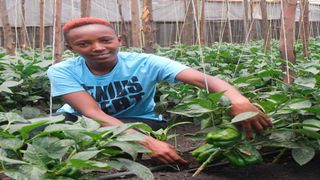
Jackline Gikonyo on her capsicum farm in Elburgon, Nakuru County.
| John Njoroge | Nation Media GroupSeeds of Gold
Premium
A young farmer’s lessons on reaping from capsicum
Jackline Gikonyo’s farm in Elburgon, Nakuru County, hosts tens of capsicum plants neatly grown inside a greenhouse.
Seeds of Gold team finds the former food and beverage management trainer at the Kenya Industrial Training Institute (KITI) in Nakuru, tending to the crop.
“I was introduced to capsicum farming by one of my friends who planted them in Njoro. So when I lost my job about mid last year, I knew this is what I wanted to do,” she says.
She set up the greenhouse that sits on quarter-acre family land in June and bought seedlings to plant, spending about Sh250,000 to start the venture. Her greenhouse host 3,000 seedlings. “Capsicum is easier to grow but one should look out for pests like aphids that invade the crop during growth. They affect the plant’s ability to make food, distort growth and hinders production,” says Jackline, who sources irrigation water from a nearby stream.
In her first harvest that came after 75 days, she collected 60kg of the green capsicums and sold them at Sh60 per kilo to local traders.
Besides the green variety, there is also yellow and red types. Each capsicum tree produces over 3kg of fruits or between 50 and 100 pieces if the crop is well-tended to during growth.
She harvests over 60kg every week. “I get some good money from the crop that has offered me employment,” says the farmer who employs at least three people depending on need.
In the few months she has been farming, she has learnt that one can get good money from a small portion of land. “When you stick to the right practices, the harvest is good and thus the money,” says Jackline, who attends field days for lessons that include on soil testing.
She plans to expand the venture to 10 acres where she will grow vegetables and other horticultural crops.
Besides pests and diseases, her other challenges are poor road network, especially if it rains as the roads become inaccessible. But this has not discouraged the farmer who advises the youth to embrace horticultural farming for good income.
Molo sub-county agricultural officer Alfred Waithaka discourages farmers from mono-cropping as it affects the soil fertility.
“Farmers should practice crop rotation after the end of every season for better yields. Soil testing is equally important as it helps farmers to establish the health of the soil,” says Waithaka.
According to him, the good thing with capsicum is that the crop matures from two-and-half to three months and farmers can continue harvesting for up to one year if the crop is tended well. “If the capsicums are well fertilised, farmers can do crop ratoon which allows it to rise or shoot into a new crop and produce more peppers.”
Capsicums improve metabolism, lowers the risk of cancer, relieve pain and boost immunity.





